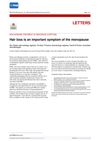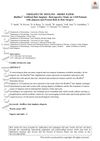 9 citations,
May 2015 in “Cardiology Clinics”
9 citations,
May 2015 in “Cardiology Clinics” The conclusion is that managing cholesterol is important for women, especially during pregnancy, breastfeeding, and with PCOS, and involves regular screening and careful treatment choices.
 3 citations,
February 2016 in “Endocrinology and Metabolism Clinics of North America”
3 citations,
February 2016 in “Endocrinology and Metabolism Clinics of North America” Manage women's cholesterol with diet, exercise, and careful treatment choices, especially during pregnancy, PCOS, and menopause.
 3 citations,
January 2007 in “Elsevier eBooks”
3 citations,
January 2007 in “Elsevier eBooks” The document concludes that individualized treatment and lifestyle changes are important for managing menopause symptoms and health risks.
 3 citations,
June 1983 in “Archives of Dermatology”
3 citations,
June 1983 in “Archives of Dermatology” Aminopterin effectively improves skin conditions but has toxic side effects that need careful monitoring.
 2 citations,
January 2011 in “Elsevier eBooks”
2 citations,
January 2011 in “Elsevier eBooks” Early treatment of acne is crucial to prevent scarring and psychological effects.
 February 2012 in “InTech eBooks”
February 2012 in “InTech eBooks” PCOS increases the risk of heart disease and type 2 diabetes in women.
70 citations,
September 2017 in “Expert opinion on therapeutic patents” The review suggests that while many AKR1C3 inhibitors show promise for treating certain cancers, more research is needed to confirm their effectiveness in humans.
 20 citations,
April 2021 in “Journal of Womens Health”
20 citations,
April 2021 in “Journal of Womens Health” Testosterone can help premenopausal and postmenopausal women with low sexual desire, but its long-term safety is unclear and it's not widely approved for this use.
 54 citations,
May 2018 in “Journal of The European Academy of Dermatology and Venereology”
54 citations,
May 2018 in “Journal of The European Academy of Dermatology and Venereology” Low level laser therapy works best for hair loss, followed by PRP, finasteride, and minoxidil.
 1 citations,
September 2018 in “Australasian Journal of Dermatology”
1 citations,
September 2018 in “Australasian Journal of Dermatology” A boy with GAPO syndrome had hair loss similar to male pattern baldness without hormone issues, possibly due to skin or blood vessel problems.
 90 citations,
December 2007 in “Current Oncology”
90 citations,
December 2007 in “Current Oncology” Non-hormonal treatments should be used first for sexual dysfunction in postmenopausal breast cancer patients on aromatase inhibitors, with hormones as a second option.
 76 citations,
January 2007 in “American Journal of Clinical Dermatology”
76 citations,
January 2007 in “American Journal of Clinical Dermatology” Women with PCOS often have skin problems like excessive hair, acne, hair loss, and dark patches, which can be treated with hormonal and non-hormonal therapies.

Doctors recommend postoperative radiation for male breast cancer, advise against testosterone for vasomotor symptoms post-adrenalectomy, suggest non-hormonal treatments for atrophic vaginitis after mastectomy, note no specific treatment for anticoagulant-induced hair loss, and call for more research on silicosis from silicon carbide exposure.
 20 citations,
July 2009 in “Journal of Pediatric and Adolescent Gynecology”
20 citations,
July 2009 in “Journal of Pediatric and Adolescent Gynecology” Quick treatment of hair disorders in teenage girls is important because of the emotional effects.
 1 citations,
January 2018 in “BMJ”
1 citations,
January 2018 in “BMJ” Many women experience significant hair loss during menopause, and topical minoxidil is an effective treatment.
 9 citations,
January 1997 in “Gynecological Endocrinology”
9 citations,
January 1997 in “Gynecological Endocrinology” The document concludes that treating androgen excess needs patience, managing expectations is important, and many drugs used are not officially approved, suggesting cosmetic options for mild cases.
 7 citations,
September 2023 in “Cancer Treatment Reviews”
7 citations,
September 2023 in “Cancer Treatment Reviews” Managing side effects of endocrine therapy is crucial to improve adherence and survival in breast cancer patients.
 14 citations,
October 2020 in “Natural Products and Bioprospecting”
14 citations,
October 2020 in “Natural Products and Bioprospecting” Various treatments, including FDA-approved drugs, natural products, and oral supplements, can help with hair loss, but a patient's medical history and potential allergies should be considered when choosing a treatment.
 50 citations,
May 2020 in “Journal of Clinical Medicine”
50 citations,
May 2020 in “Journal of Clinical Medicine” Non-binary transgender individuals need personalized hormonal treatments for better well-being and quality of life.
 15 citations,
June 2020 in “Experimental Dermatology”
15 citations,
June 2020 in “Experimental Dermatology” Hormones and genes affect hair growth and male baldness.
 15 citations,
January 1988 in “Drugs”
15 citations,
January 1988 in “Drugs” The document concludes that treatments for female hair loss and excessive hair growth are temporary and not well-studied.
 8 citations,
January 1989 in “Journal of Dermatological Treatment”
8 citations,
January 1989 in “Journal of Dermatological Treatment” This text talks about how to treat hair loss in women. It suggests different options and stresses the importance of support.
 3 citations,
November 2020 in “Biological Trace Element Research”
3 citations,
November 2020 in “Biological Trace Element Research” Men with hair loss may lack zinc, copper, and vitamin D; supplements could help.
 3 citations,
June 2019 in “Dermatologic Therapy”
3 citations,
June 2019 in “Dermatologic Therapy” Biofibre hair implant is a safe, effective treatment for baldness with 95% patient satisfaction.
 2 citations,
August 2020 in “International Journal of Cosmetic Science”
2 citations,
August 2020 in “International Journal of Cosmetic Science” Lindera strychnifolia root extract may help balance scalp bacteria and potentially reduce hair loss.
 November 2024 in “EMJ Dermatology”
November 2024 in “EMJ Dermatology” A new topical treatment using SAMiRNA technology shows promise in increasing hair growth for androgenetic alopecia.
 February 2012 in “Expert Review of Endocrinology & Metabolism”
February 2012 in “Expert Review of Endocrinology & Metabolism” The document suggests more research is needed to understand the link between baldness and prostate cancer.
 51 citations,
January 2004 in “Skin Pharmacology and Physiology”
51 citations,
January 2004 in “Skin Pharmacology and Physiology” The document explains hair growth and shedding, factors affecting it, and methods to evaluate hair loss, emphasizing the importance of skin biopsy for diagnosis.
 2 citations,
December 2022 in “Journal of Clinical Medicine”
2 citations,
December 2022 in “Journal of Clinical Medicine” Medications for glucose metabolism and weight control, combined therapy options, and herbal medicines may help regulate menstrual cycle in adolescents with PCOS.
 February 2024 in “ACS Omega”
February 2024 in “ACS Omega” The Shen Bai Hair Growing Decoction may help treat hair loss by promoting hair growth and reducing inflammation.





























